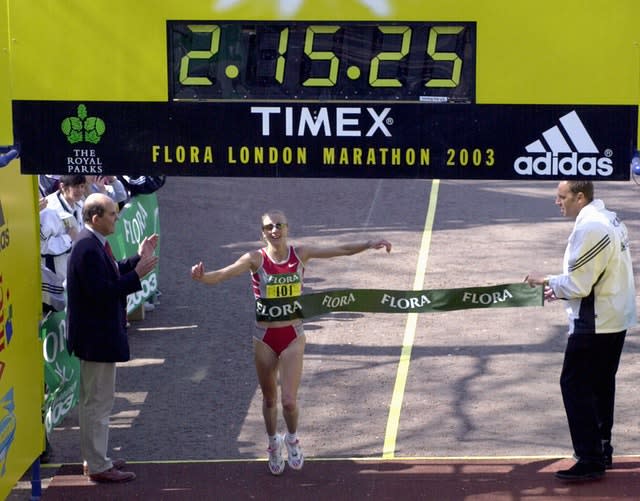Race against time: How the marathon world record has changed down the years
Eliud Kipchoge and Brigid Kosgei produced historic marathon-running feats this weekend, with the two-hour mark broken followed by a new women’s world record.
Kipchoge ran a remarkable one hour, 59 minutes and 40 seconds in Vienna on Saturday morning, celebrating his achievement by claiming “no human is limited”.
That did not qualify as an official world record, with Kipchoge assisted by a team of pacemakers in a specially organised event, but Kenyan compatriot Kosgei ran 2hr 14min 04sec in Sunday’s Chicago marathon to lower Paula Radcliffe’s 16-year-old record by over a minute.
Yesterday, marathoner Eliud Kipchoge became the first ever to break two hours. Today in Chicago, Brigid Kosgei set a new women’s world record. Staggering achievements on their own, they’re also remarkable examples of humanity’s ability to endure—and keep raising the bar.
— Barack Obama (@BarackObama) October 13, 2019
Here, the PA news agency takes a look at the progression of the men’s and women’s records since the event’s inception over a century ago.
Men’s record

With early marathons not run over a standardised distance, the first official record dates from the 1908 London Olympics – the distance of 26 miles, 385 yards – chosen by the British Olympic committee to allow the race to start from Windsor Castle – was codified by the IAAF in 1921.
Italian Dorando Pietri was first across the finish line but, having collapsed on the track and been assisted by race officials, he was disqualified and Johnny Hayes of the United States took the gold medal and what would come to be recorded as the first official marathon world record, 2hr 55min 18.4sec.
That was gradually lowered by several athletes until American Albert Michelsen became the first man to break two and a half hours, running 2:29:01.8 in Port Chester, New York in 1925.
Korean Sohn Kee-chung held the pre-World War Two record at 2:26:42, set in Tokyo in 1935, with the 2hr 20min mark falling in 1953 as Britain’s Jim Peters broke the record four times in just over two years.
It was another decade before Buddy Edelen of the USA took the record below 2hr 15min, with Australia’s Derek Clayton the first man under 2hr 10min in 1967 in Fukuoka, Japan.

Aside from Abebe Bikila’s efforts for Ethiopia in the 1960s, the African dominance of distance running is actually a relatively recent phenomenon but Khalid Khannouchi held the record at the turn of the century after running 2:05:42 for Morocco in Chicago in 1999.
He switched to represent the US before shaving another four seconds off the record but it has been in Kenyan or Ethiopian hands since, with Kenyans Patrick Makau, Wilson Kipsang and Dennis Kimetto setting new marks at the Berlin marathon before Kipchoge ran 2:01:39 there in 2018.
That remains the record but his 1:59:40 in favourable conditions demonstrated what is possible.
Women’s record

The women’s marathon was not widely raced until after World War One and early record remain disputed – the IAAF credits Britain’s Violet Piercy with the first record of 3hr 40min 22sec in 1926 but the Association of Road Running Statisticians (ARRS) ruled that the course was not regulation length.
Fellow Briton Dale Greig’s 1964 record of 3:27:45 is the first for which no dispute exists, while American Elizabeth Bonner is recognised by the IAAF as the first women to break three hours – running 2:55:22 in September 1971. The governing body does not recognise Australian Adrienne Beames’ sub three-hour run around three weeks earlier.
Norwegian Grete Waitz set several records in New York between 1978 and 1983, including the first two-and-a-half-hour women’s marathon when she ran 2:27:32.6 in 1979.
Naoko Takahashi was the first to break 2hr 20min and her record was lowered by Catherine Ndereba and then Radcliffe, twice. The Briton’s best of 2:15:24.6 stood until Kosgei’s effort on Sunday.

